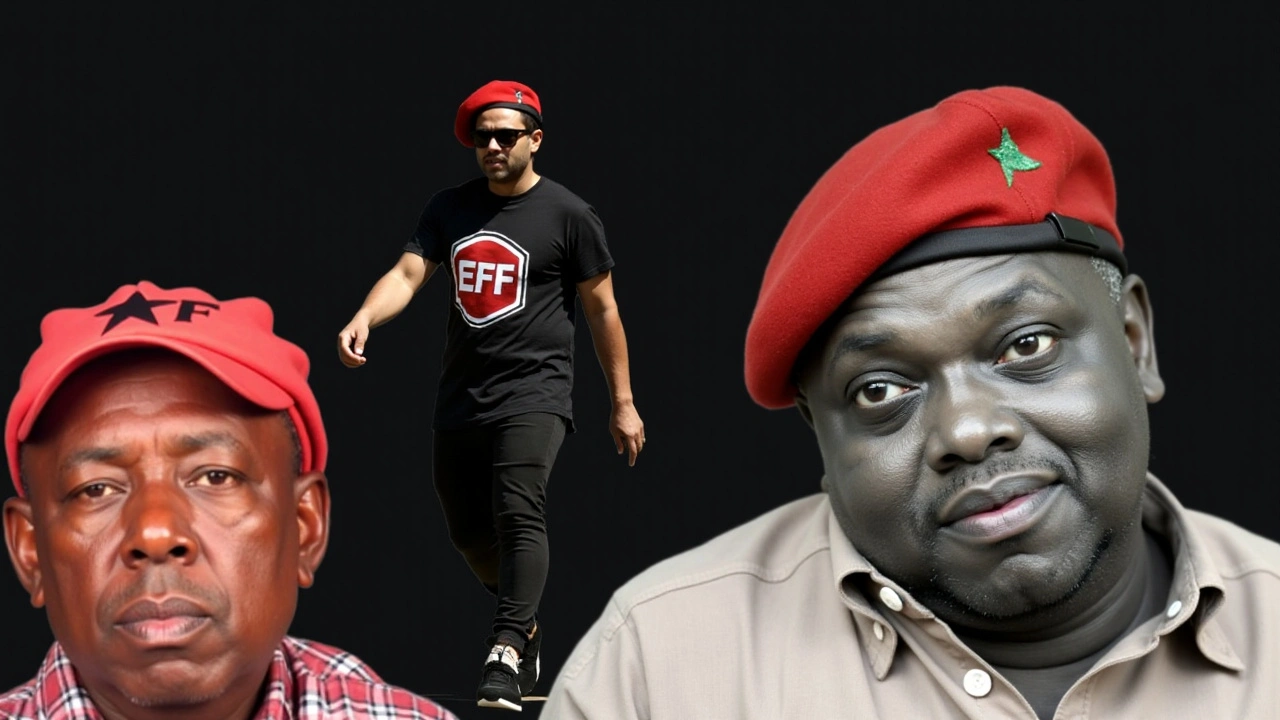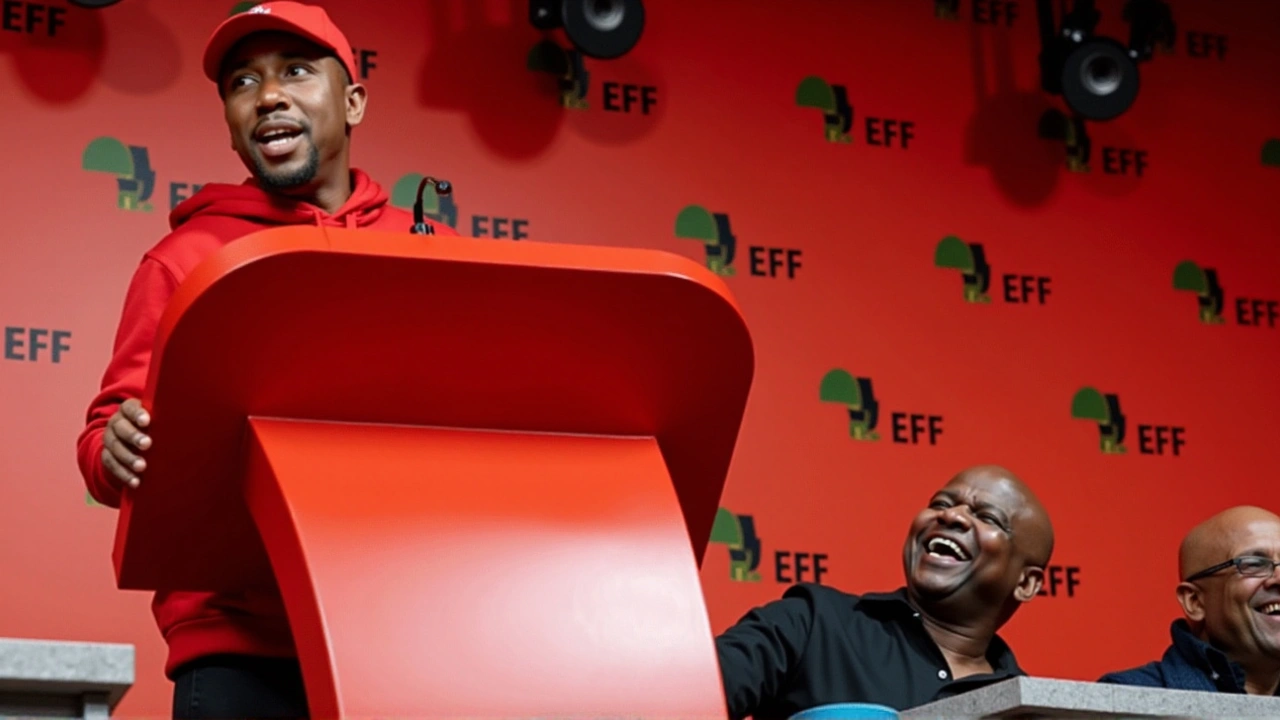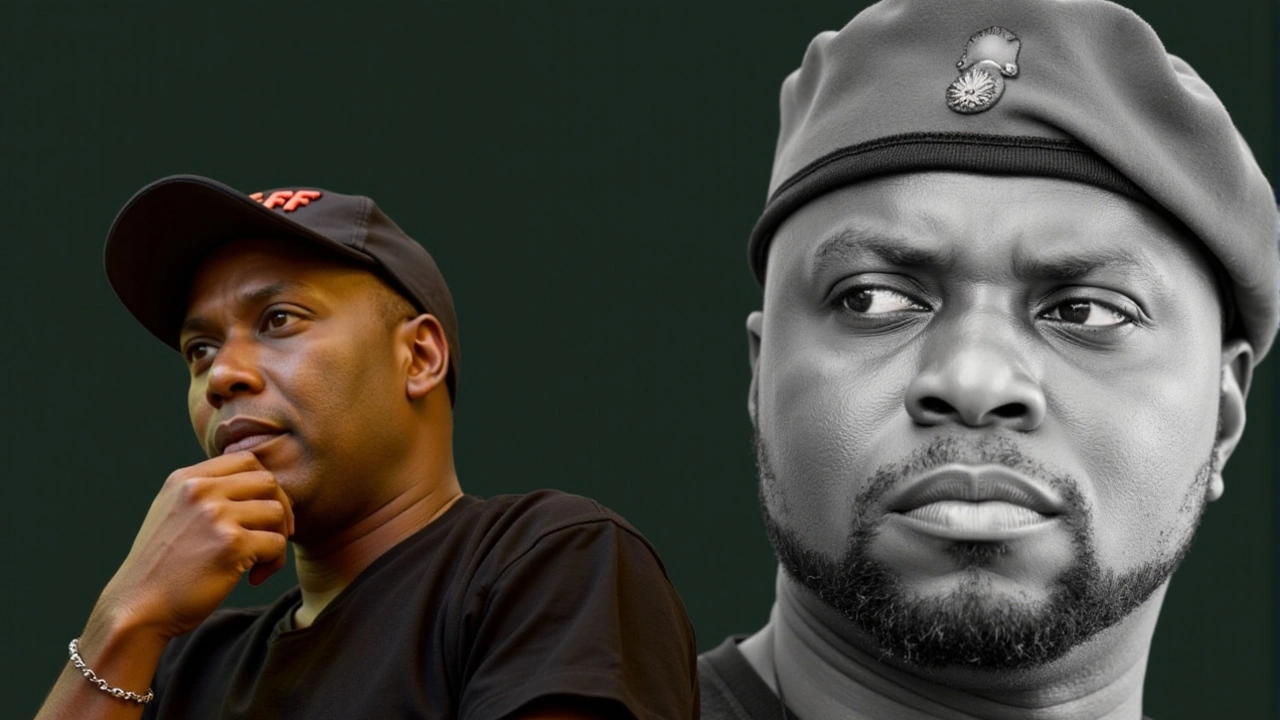Floyd Shivambu Leaves EFF for MK: Political Shake-Up in South Africa

Floyd Shivambu's Impact on the EFF
Floyd Shivambu was more than just a prominent member of the Economic Freedom Fighters (EFF); he was a cornerstone of its foundation and a key strategist. His departure from the party to join the uMkhonto we Sizwe Military Veterans Association (MK) marks a significant turning point. Shivambu’s influence within the EFF cannot be overstated. From his intellectual contributions to his strategic planning, he was integral to the party’s formation and its subsequent rise in South African politics. His work in shaping the EFF's policies and public stance has been profound, making his departure not just a personnel change but a seismic shift for the party.
Shivambu’s partnership with EFF leader Julius Malema was particularly noteworthy. Together, they formed a dynamic duo that was both fearless and charismatic, often steering the party through turbulent political seas. Their synergy was palpable in public appearances and private discussions alike, often giving the impression that the two were inseparable. While Malema served as the face of the party, it was Shivambu’s strategic genius that often drove the party's actions and policies. His role as the intellectual engine behind the EFF made his presence invaluable.
The Strategic Mind Behind EFF
In terms of strategy, Shivambu played a pivotal role in various campaigns that elevated the EFF's profile. His ability to navigate the complex political landscape of South Africa, while keeping the party’s radical agenda intact, was remarkable. His departure has raised questions about how the party will fill this strategic void. Shivambu's advocacy for economic freedom and social justice was not just rhetoric; it was backed by well-thought-out plans and actions that resonated with many South Africans. His contributions helped frame the EFF as a formidable force in South African politics, capable of challenging entrenched political entities.
Shivambu's intellectual prowess also extended to his role in policy formulation. His keen understanding of South Africa's socio-economic issues enabled him to craft policies that were both radical and feasible. This blend of radicalism and realism made the EFF's policies not just aspirational but also practical, striking a chord with a broad spectrum of the South African populace. His ability to synthesize complex ideas into coherent and compelling policy positions was a rare talent that will be sorely missed by the EFF.

Julius Malema and Shivambu: A Dynamic Duo
The relationship between Julius Malema and Floyd Shivambu was more than just a professional partnership; it was a symbiotic bond that fueled the EFF's rise. Malema, with his fiery rhetoric and charismatic leadership, was the public face of the party. However, Shivambu was the tactical mind, the one who often worked behind the scenes to ensure that the party's strategies were sound and effective. This combination of charisma and strategy made the EFF a unique political entity.
Their relationship was not without its challenges. Both men are known for their strong personalities and differing viewpoints on various issues. However, it was their ability to reconcile these differences and present a united front that made their partnership so effective. Shivambu's departure leaves Malema without his trusted lieutenant, raising questions about how the EFF will navigate future challenges without this crucial dynamic.
Implications for South Africa's Political Landscape
Shivambu's defection to the uMkhonto we Sizwe Military Veterans Association (MK) has broader implications for South Africa’s political landscape. The MK, once the armed wing of the African National Congress (ANC), has its own history and legacy. Shivambu's move raises questions about what this means for both the MK and the EFF. For the EFF, it represents a significant loss of talent and strategic acumen. For the MK, it could signal a reinvigoration or a shift in its role within the broader South African political context.
This move also prompts speculation about the motivations behind Shivambu's decision. Was it a strategic maneuver to align with what he perceives as a more influential or impactful group? Or were there unresolved tensions within the EFF that prompted his departure? These questions will likely dominate South African political discourse in the coming months, as analysts and commentators seek to understand the full ramifications of this significant shift.

The Future Trajectory of the EFF
Without Floyd Shivambu, the EFF faces the challenge of maintaining its course without one of its chief strategists. The party will need to find a way to fill the void left by his departure. This will likely entail promoting new leaders within the party ranks and possibly re-evaluating its strategies to continue its forward momentum. Shivambu's departure may also prompt the EFF to engage in introspection, examining its internal dynamics and addressing any underlying issues that may have contributed to his decision to leave.
Shivambu's departure also brings to light the importance of leadership stability within political parties. The EFF will need to ensure that it can maintain the loyalty and trust of its remaining leaders and members to prevent further defections. This might involve strengthening internal communication, providing more opportunities for leadership development, and ensuring that the party’s vision and mission continue to resonate with its base.
Conclusion: A Turning Point in South African Politics
In conclusion, Floyd Shivambu's departure from the EFF to join the MK signifies a major shift in South Africa's political landscape. His intellectual and strategic contributions to the EFF have been instrumental in the party’s rise, and his absence will undoubtedly be felt. However, his move to the MK opens up new possibilities and challenges for both organizations. As South Africa watches these developments unfold, one thing is clear: Shivambu's defection is a turning point that will have far-reaching implications for the future of South African politics.

mary oconnell
August 16, 2024 AT 23:43Well, isn't this just the classic case of political realignment masquerading as a personal career pivot? The whole saga reeks of strategic calculus, a veritable chess match where Shivambu has just moved his queen to a new board. One could argue that the EFF's ideological scaffolding was already wobbling, and this defection is the seismic tremor that finally cracks the foundation. It's almost poetic, in a sardonic, hyperreal sense, how power structures implode under their own inflated rhetoric. So, cheers to the inevitable upheaval – the party that once rode the wave of radical populism now has to navigate a sea of uncertainty.
Michael Laffitte
August 22, 2024 AT 21:52Wow, talk about a dramatic turn of events! It feels like the political theatre just got a new act, and everyone's front row seat is front‑and‑center. I've always admired how the EFF tried to rewrite the rules, but this move? Pure fireworks. The sheer audacity of aligning with MK adds a whole new layer of intrigue – you can almost hear the dramatic score swelling in the background. Honestly, I can’t wait to see how the narrative unfolds; it's going to be a wild ride!
sahil jain
August 28, 2024 AT 20:02Shivambu's shift definitely shakes up the balance of power, especially in a landscape already marked by intense competition. The move could signal a recalibration of political priorities, perhaps aiming for broader coalition building. It also raises questions about policy continuity for the EFF, which may have to rethink its strategic roadmap. Moreover, the MK's own legacy adds complexity to this realignment. Overall, it's a pivotal moment that will likely reshape discourse across the board.
Bruce Moncrieff
September 3, 2024 AT 18:11That’s a massive shift-talk about a bold move! It feels like the political arena just got a fresh spin and everybody’s watching. The dynamics are changing fast and the stakes have never been higher? It’s clear that this will force parties to rethink their strategies and alliances. The drama is real and the anticipation is high.
Dee Boyd
September 9, 2024 AT 16:20From a normative standpoint, this development epitomizes the ethical erosion of collective accountability. One must interrogate the hegemonic narratives that undergird such defections, which invariably propagate a discourse of opportunistic realignment. The rhetoric employed by the MK now serves as an apparatus for legitimizing power consolidation under the guise of ideological fidelity. Consequently, the political epistemology of the EFF is subjected to a profound ontological crisis. Ultimately, this signals a troubling trajectory for South African democratic praxis.
Carol Wild
September 15, 2024 AT 14:29It is, without a doubt, the most conspicuous indicator of systemic decay that one could possibly imagine, a subtle yet inexorable erosion of the very foundations upon which the EFF once prided itself. When we peel back the layers of this political maneuver, we see the underlying tapestry woven with threads of clandestine influence, hidden agendas, and perhaps even the faint echo of a grand design orchestrated by unseen puppeteers. This defection is not merely a change of affiliation; it represents a seismic shift in the intricate balance of power, one that resonates far beyond the confines of a single party. Historically, such moves have been precursors to larger, more insidious transformations within the sociopolitical fabric, and this instance appears to follow that alarming pattern. Moreover, the timing-coinciding with notable legislative reforms and a surge in public dissent-cannot be dismissed as a mere coincidence, hinting at a deliberate alignment of interests. Indeed, the very nature of Shivambu's departure may well be a calculated stratagem, designed to destabilize the opposition and reinforce an emergent hegemony that has quietly taken root. If we consider the broader geopolitical climate, where power blocs are constantly reconfiguring their alliances, this move mirrors a larger, perhaps global, trend toward consolidation under seemingly innocuous banners. The involvement of the MK, a group historically associated with armed struggle and ideological fervor, adds an additional layer of complexity, suggesting an ideological renaissance that could reshape the narrative of South African politics. It is, of course, crucial to acknowledge the potential for internal factionalism within both the EFF and MK, which could render this union fragile, but the mere fact that such a high-profile figure has crossed the aisle is in itself a profound statement. In reflecting upon the philosophical underpinnings of such political realignments, one must ask whether the pursuit of power has eclipsed the original ideals that motivated these movements. The answer, perhaps, lies within the public discourse that will inevitably erupt as analysts, scholars, and everyday citizens attempt to parse the motives and ramifications of this shift. Ultimately, the reverberations of this event will be felt not just within parliamentary chambers, but across civil society, media, and the streets, where the narrative of resistance or acquiescence will be contested. In the grand tapestry of South African political history, this may well be a turning point that scholars will reference for decades, a moment when the balance of ideological forces tipped dramatically, ushering in a new era of governance, controversy, and, perhaps, unexpected collaboration.
Rahul Sharma
September 21, 2024 AT 12:38From an analytical perspective, Shivambu's departure warrants a meticulous examination, and one must consider the multiplicity of factors at play. First, the strategic realignment may be interpreted as a response to intra‑party dynamics that have, over time, fostered ideological divergence; second, the alignment with the MK indicates a potential recalibration of political objectives, aiming perhaps to broaden appeal among veteran constituencies. Moreover, the implications for the EFF are profound: a vacuum emerges in policy formulation, and the party may need to accelerate leadership development pipelines, thereby reinforcing its internal governance structures. Simultaneously, the MK stands to gain a notable influx of intellectual capital, potentially reshaping its public perception and operational capacity, which could, in turn, influence the broader socio‑political discourse. It is also worth noting, in a comparative context, that similar defections in other geopolitical settings have precipitated both short‑term volatility and long‑term structural change, a pattern that appears likely here as well. Finally, the confluence of these developments underscores the fluid nature of South African politics-a tapestry woven from historical legacies, contemporary aspirations, and the relentless pursuit of influence.
Emily Kadanec
September 27, 2024 AT 10:48Oh man I think Shivambu moving over to MK is kinda like when you swap one brand of chips for another-still salty but different flavor. I guess he thinks the MK vibe will give him more room to talk big ideas. It's not like the EFF is totally dead, but loosing a brainy dude could mess up some plans. Maybe he'll bring some fresh perspective and we will see some cool changes. Not sure how it all pans out, but it's definitely something to watch.
william wijaya
October 3, 2024 AT 08:57The ripple effect of this move is palpable, echoing across the corridors of power with a blend of intrigue and cautionary whisper. It underscores how strategic realignments can recalibrate the ideological spectrum, especially when seasoned tacticians like Shivambu are involved. The EFF now faces a crossroads, forced to reexamine its internal dynamics and future trajectory. Meanwhile, the MK's acquisition of such a prominent figure may well amplify its political capital, thrusting it further into the national conversation. In any case, the political chessboard has certainly acquired a new, compelling piece.
Lemuel Belleza
October 9, 2024 AT 07:06This is just a shift.
faye ambit
October 15, 2024 AT 05:15When considering the broader philosophical implications, one can see Shivambu's transition as a microcosm of the fluidity inherent in political identities. It invites reflection on the nature of allegiance and the mutable boundaries that define ideological commitment. Such movements also challenge us to contemplate the ethical dimensions of loyalty, both personal and collective, within the ever‑shifting tapestry of public life. In the context of South African politics, this development may serve as a catalyst for deeper dialogue about governance, representation, and the pursuit of common good. Ultimately, the episode provides a fertile ground for nuanced discussion and a reminder that political landscapes are perpetually in flux.
Subhash Choudhary
October 21, 2024 AT 03:25Man, this is a wild one. Shivambu hopping to MK feels like the political equivalent of switching teams mid‑season. It’s going to shake things up for sure, and I’m curious how the EFF handles the gap. Meanwhile, MK might just get a fresh burst of energy. Let’s see how the fans react; I expect a lot of debates on the internet. The next few weeks will be interesting for sure.
Ethan Smith
October 27, 2024 AT 01:34Analyzing this development with precision, it becomes evident that Shivambu's defection introduces a nuanced variable into the political equation. The EFF must now address the strategic void left by his departure through systematic leadership restructuring. Concurrently, the MK stands to benefit from his expertise, potentially enhancing its policy articulation capabilities. Such a realignment underscores the dynamic nature of political affiliations within a democratic framework. It will be essential to monitor the subsequent policy shifts and public reception as the situation evolves.
Evelyn Monroig
November 1, 2024 AT 22:43Clearly this is not just a simple party switch; it’s a calculated infiltration designed to redirect the broader agenda. The MK’s resurgence with Shivambu on board suggests an orchestrated effort to consolidate power under a hidden cabal. This maneuver could be part of a larger scheme to undermine democratic institutions and tighten control over the narrative. We must remain vigilant, as such strategic alignments often precede covert operations aimed at reshaping the political landscape. The implications are far‑reaching, potentially affecting everything from policy decisions to civil liberties. In short, this is a red flag that demands immediate scrutiny.